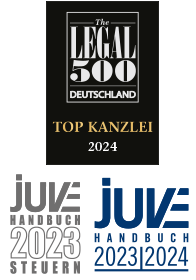ECJ ruling of 26th February 2019, reference no.: C-135/147 - Standstill clause and taxation under controlled foreign corporation rules in a third-country case (Switzerland)
In its ruling of 26th February 2019, ECJ clarified that the provisions of AStG (Foreign Tax Act), in principle, do not restrict the free movement of capital guaranteed under EU legislation in as far as outstanding audits prove that the relevant provisions under AStG already existed on 31st December 1993 (standstill clause).
Background:
A domestic limited liability company (GmbH) held a 30-percent interest in a Swiss joint stock corporation which generated income from assigned financial claims. The German financial authorities subjected this income of the domestic GmbH to taxation under controlled foreign corporation rules as intermediate income of a capital investment nature (section 7 sub-section 6 and 6a AStG). The GmbH sued regarding this. The proceedings were forwarded to the Federal Fiscal Court (BFH), which, in turn, referred the matter to the ECJ.
Even though the BFH was of the opinion that the GmbH was taxed lawfully; however, it expressed doubts regarding the compatibility of taxation under controlled foreign corporation rules pursuant to AStG with the German Foreign Tax Act according to art. 63 TFEU.
In principle, the application of the free movement of capital is safeguarded by EU legislation. The standstill clause is considered the only exception to this. Under this clause, the restrictions regarding third countries which applied on 31st December 1993 can still be applied even though, in principle, they violate the free movement of capital.
ECJ ruling:
ECJ has now ruled that – in spite of subsequent expansions of the scope of application of the AStG provision concerned – the standstill clause is still applicable in principle. However, the concrete applicability continues to depend on whether the restriction established in section 7 sub-section 6/6a AStG has applied consistently since 31st December 1993. The ECJ now has to provide a final ruling on this in the case referred to above.
Furthermore, the ECJ ruling does not exclude the taxation of intermediate income from being excluded as a result of a so-called motive test. This is because, so far, AStG does not give domestic companies any possibility to prove that shareholdings in third-country companies are not purely artificial structures for the purpose of tax avoidance.
Note by LHP
In cases in which the tax office has subjected intermediate income of a capital investment nature (according to section 7 sub-section 6/6a AStG) to taxation under foreign controlled corporation rules, the assessments should be left open. In the event of an objection and legal action, the position that a motive test also has to be carried out with regard to companies in third countries and that, if applicable, taxation under controlled foreign corporation rules can be avoided, can then be adopted.
Cologne
An der Pauluskirche 3-5,
50677 Cologne,
Telephone: +49 221 39 09 770
Zurich
Tödistrasse 53,
CH-8027 Zurich,
Telephone: +41 44 212 3535


